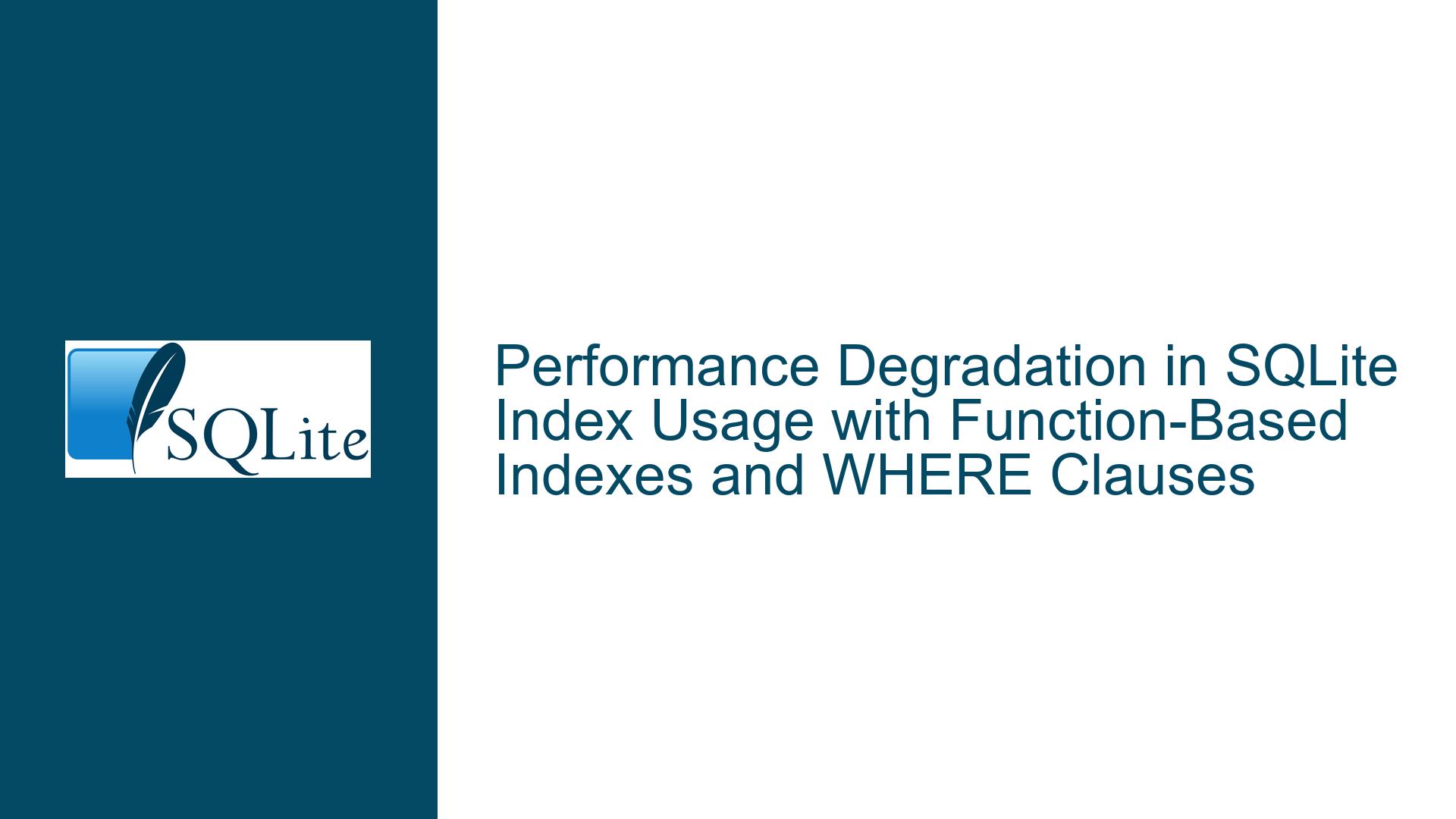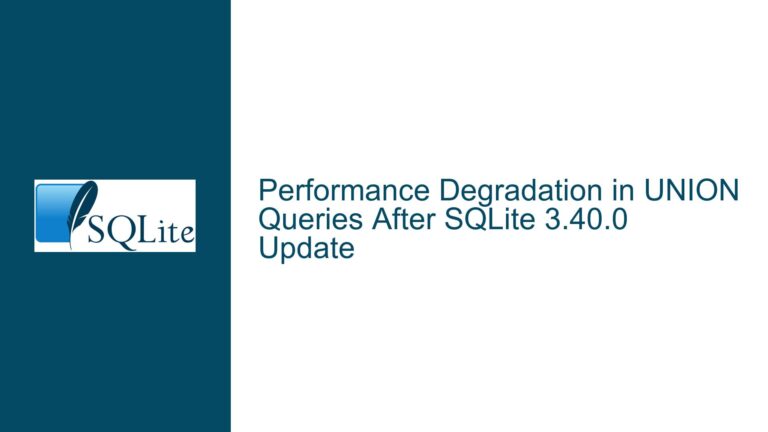Performance Degradation in SQLite Index Usage with Function-Based Indexes and WHERE Clauses
Issue Overview: Performance Degradation in Index Usage with Function-Based Indexes and WHERE Clauses
The core issue revolves around a performance degradation observed in SQLite when executing queries that involve function-based indexes combined with specific WHERE clause conditions. This degradation manifests as the query planner opting for a full table scan (SCAN) instead of utilizing the available function-based index (SEARCH), leading to suboptimal query performance. The problem is particularly pronounced in SQLite versions 3.36 and later, though it also affects earlier versions in certain join scenarios.
The issue is rooted in the interaction between the SQLite query optimizer’s constant propagation mechanism and function-based indexes. Constant propagation is an optimization technique that replaces variables with their known constant values to simplify expressions and improve query performance. However, in this case, the optimization inadvertently interferes with the query planner’s ability to recognize and utilize function-based indexes effectively.
The problem becomes evident when a query includes a function-based index and a WHERE clause that combines a function call with a direct column comparison. For example, consider a table test1 with a column value and an index on abs(value). A query such as SELECT * FROM test1 WHERE abs(value) = abs(1) AND value = 1 should ideally use the test1_abs_value_index to efficiently locate the relevant rows. However, due to the constant propagation optimization, the query planner transforms the condition abs(value) = abs(1) into abs(1) = abs(1), effectively removing the dependency on the value column. As a result, the index on abs(value) is no longer applicable, forcing the query planner to resort to a full table scan.
This behavior was introduced in SQLite version 3.36, specifically starting from commit b775c976822b1951506bf01c8cc6b223ba079627. Prior to this commit, the issue was limited to queries involving multiple tables (e.g., joins), but the changes in this commit extended the problem to single-table queries as well. The commit modified the propagateConstants() function, which is responsible for the constant propagation optimization, by removing a condition that previously restricted its application to multi-table queries.
Possible Causes: Interaction Between Constant Propagation and Function-Based Indexes
The primary cause of the performance degradation lies in the interaction between the constant propagation optimization and function-based indexes. Constant propagation is designed to simplify queries by replacing variables with their known constant values, thereby reducing the complexity of the query and potentially improving performance. However, this optimization can inadvertently interfere with the query planner’s ability to recognize and utilize function-based indexes.
In the context of function-based indexes, the query planner relies on the presence of specific expressions in the WHERE clause to determine whether an index can be used. For example, an index on abs(value) can only be used if the WHERE clause contains a condition that directly references abs(value). When constant propagation is applied, it can transform expressions in a way that removes the dependency on the indexed column, rendering the index unusable.
Consider the example query SELECT * FROM test1 WHERE abs(value) = abs(1) AND value = 1. The constant propagation optimization recognizes that value is constrained to be 1 by the condition value = 1. It then replaces value with 1 in the expression abs(value) = abs(1), transforming it into abs(1) = abs(1). While this transformation simplifies the expression, it also removes the dependency on the value column, making the index on abs(value) irrelevant. As a result, the query planner is forced to perform a full table scan instead of using the index.
This issue is exacerbated by the fact that the constant propagation optimization is applied more aggressively in SQLite version 3.36 and later. Prior to version 3.36, the optimization was restricted to queries involving multiple tables, which limited its impact on function-based indexes. However, the changes introduced in commit b775c976822b1951506bf01c8cc6b223ba079627 removed this restriction, allowing the optimization to be applied to single-table queries as well. This change inadvertently extended the problem to a broader range of queries, leading to the observed performance degradation.
Troubleshooting Steps, Solutions & Fixes: Addressing the Performance Degradation
To address the performance degradation caused by the interaction between constant propagation and function-based indexes, several approaches can be taken. These include modifying the query to avoid triggering the optimization, adjusting the index strategy, or applying specific fixes to the SQLite codebase.
1. Modifying the Query to Avoid Constant Propagation
One effective workaround is to modify the query in a way that prevents the constant propagation optimization from interfering with the function-based index. This can be achieved by introducing a unary + operator before the column reference in the WHERE clause. The unary + operator has no effect on the value of the column but prevents the query planner from applying constant propagation to that specific expression.
For example, consider the original query:
SELECT * FROM test1 WHERE abs(value) = abs(1) AND value = 1;
By adding a unary + operator to the value column, the query can be rewritten as:
SELECT * FROM test1 WHERE abs(value) = abs(1) AND +value = 1;
This modification prevents the query planner from replacing value with 1 in the abs(value) expression, allowing the index on abs(value) to be used as intended.
2. Adjusting the Index Strategy
Another approach is to adjust the index strategy to better align with the query patterns. In some cases, it may be possible to create a composite index that includes both the function-based expression and the column itself. This can help the query planner recognize the index even when constant propagation is applied.
For example, instead of creating an index solely on abs(value), a composite index on (abs(value), value) can be created:
CREATE INDEX test1_abs_value_composite_index ON test1 (abs(value), value);
With this composite index, the query planner may be able to use the index even when constant propagation is applied, as the index includes both the function-based expression and the column itself.
3. Applying Specific Fixes to the SQLite Codebase
For those with access to the SQLite source code, applying specific fixes to address the issue directly in the codebase is another option. The issue was partially resolved in commit 44200596aa943963, which introduced changes to the constant propagation optimization to ensure that it does not interfere with function-based indexes.
To apply this fix, the SQLite source code can be updated to include the changes from commit 44200596aa943963. This involves modifying the propagateConstants() function to handle function-based indexes more effectively, ensuring that the optimization does not inadvertently render the index unusable.
4. Downgrading to an Earlier Version of SQLite
In cases where modifying the query or adjusting the index strategy is not feasible, downgrading to an earlier version of SQLite that does not exhibit the issue may be a viable option. Specifically, reverting to a version prior to 3.36 (e.g., version 3.35) can help avoid the performance degradation caused by the changes in commit b775c976822b1951506bf01c8cc6b223ba079627.
However, this approach should be taken with caution, as it may involve sacrificing other improvements and bug fixes introduced in later versions of SQLite. Additionally, downgrading may not be practical in all environments, particularly those where the SQLite version is tightly integrated with other software components.
5. Monitoring and Profiling Queries
Finally, it is essential to monitor and profile queries to identify instances where the performance degradation may occur. By analyzing query execution plans and performance metrics, it is possible to detect cases where the query planner is not utilizing function-based indexes as expected. This information can then be used to apply the appropriate workarounds or fixes on a case-by-case basis.
In conclusion, the performance degradation in SQLite’s index usage with function-based indexes and WHERE clauses is a complex issue that arises from the interaction between constant propagation and function-based indexes. By understanding the underlying causes and applying the appropriate troubleshooting steps, it is possible to mitigate the impact of this issue and ensure optimal query performance. Whether through query modification, index strategy adjustments, codebase fixes, or version management, there are multiple avenues to address this challenge and maintain the efficiency of SQLite-based applications.






